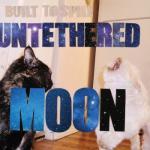
Built to Spill Untethered Moon
(Warner Bros. )
With a trajectory of over twenty years dedicated to guitar-driven rock, it’s no surprise that Doug Martsch isn’t really concerned about the time and effort it takes to write new Built to Spill albums. In a recent interview with All Music, he candidly jokes that he doesn’t have a clear idea of what he’s doing most of the time. Which is probably the best way to approach it, considering most well-established acts struggle to reclaim, or emulate, their best work with a hungry sort of desperation. It takes a certain kind of skill to write record after record with effortless ease, and what they’ve proven throughout the years is that it’s best to go forward, even if the final result may be flawed, instead of setting themselves up for a grand return.
That workmanlike approach is what gives Built to Spill its own peculiar stamp of reliability. You wouldn’t even realize that Untethered Moon is actually their first record in over six years, if only because their timeless, unfailing character is always welcome at any significant period in your life. They’re even the unlikeliest major-label lifers, Warner Bros. signees for over a decade without revealing even the slightest hint of compromise. Things didn’t go as smoothly as one would assume, though: the departure of the band’s rhythm section lead Martsch to scrap an entire album, and it wasn’t until they started to play live shows in 2013 that he developed a renewed confidence in the project’s future.
The barreling drum patterns and blistering fret work of album opener All Your Songs brings back the same urgency of late-period Built to Spill live staple Goin’ Against Your Mind, and it’s no coincidence it’s placed early on to basically prove that Martsch is ready to hit a personal marathon best. The title’s bland ambiguity is almost a refute to the countless times he’s had to explain that his songs really hold no individual meaning, so why not let the track’s smooth serpentine transitions and extended riffs speak for itself. There was a point in which Built to Spill held a tinge of anthemic purpose, but not anymore - Martsch and his cohorts want to raise the stakes with the same kind of brash, no-bullshit technical dexterity that defined their senior label mates Crazy Horse.
Despite the complete disregard to any connective lyrical strands in their songs, Martsch has proven time and time again that he can write a powerful sing-a-long that can really whip up crowds into a frenzy. This time around it’s Never Be The Same, a lackadaisical jam that leaves enough space for its sparse, though meaningful words to connect despite its casual frivolity: "But that’s the way it’s gonna be/ Because that’s the way it’s always been." Martsch’s lithe singing is what gives his song a whiff of wistful gravitas, just as he does in Horizon to Cliff, a beguiling ballad that makes another quotable impression [You can fight through all the reason/ and wait another season] before fading out without even a goodbye.
Martsch’s guitar playing forms its own innate vocabulary, one that stimulates through every tempo change and mellifluous line. This is why disaffected indie rock classics like Carry the Zero and Car still resonate in how they’re so richly multifaceted in structure and feeling. It’s a tad unfortunate that those moments in Untethered Moon require a little bit of digging to find, seeing as the band spends most of the time playing big, muscular riffs with bluesy dynamics. The gritty Americana of closer When I’m Blind just goes on and on and on, easily overstating its welcome by minute four until you realize that its bloated, extended outro is just beginning to warm up.
Untethered Moon is truly the work of a veteran musician who continues to tweak the same kind of song with the adventurousness of a curious young man. Martsch has always reflected on life’s transient nature with an understated wit, truths disguised in effective one-liners that require a little bit of effort to fully unearth. That said, he tempers these emotional fragments because he finds that they’re a secondary aspect of his body of work. What Martsch really wants to do is to play that guitar fuzz like a loose cannon, though he can’t even fully commit to it because those weaving, not to mention gleaming, song structures continue to be, and will surely always be, such a dominant presence. Perhaps it’s best to let him indulge if it’ll bring about some change.
22 April, 2015 - 04:52 — Juan Edgardo Rodriguez